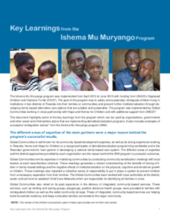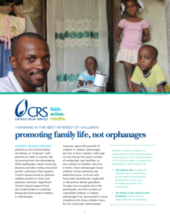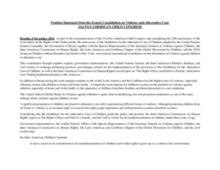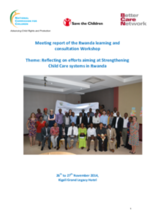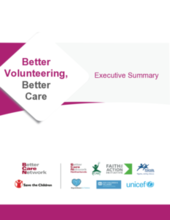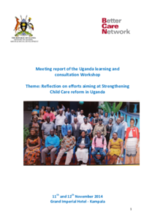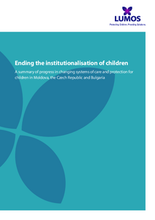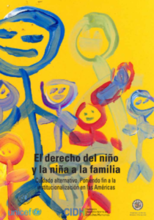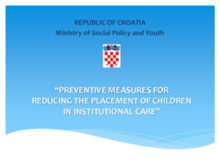Displaying 401 - 410 of 691
This document highlights some of the key learnings from the Ishema Mu Muryango program, a program designed to safely and sustainably reintegrate children living in institutions in two districts of Rwanda into their families or communities and prevent further institutionalization.
Through a desk review of peer reviewed journal and “grey” literature published in English and Russian languages, this paper provides a review of current deinstitutionalization efforts in the region, identifies potential challenges, describes the need for economic empowerment interventions, and outlines directions for future research.
This document, published by Catholic Relief Services, urges members of the Catholic faith community to consider the best interests of the child when partnering, or “twinning” with parishes in Haiti and undertaking charitable activities.
In advance of the 21st Pan American Child and Adolescent Congress, an international consultation on the elimination of violence against children in alternative care was convened. This position statement from the consultation was presented at the 21st Pan American Child and Adolescent Congress.
As part of the work of the BCN Eastern and Southern Africa Regional Initiative, the National Commission for Children in partnership with BCN, and Save the Children convened a national consultative workshop in Kigali, Rwanda on 26 and 27 November 2014. This report presents a summary of the main priority outcomes which were identified by participants during the meeting, including: evidence building and sharing, strengthening advocacy, and strengthening capacity.
This Excutive Summary is developed by the Better Volunteering Better Care
As part of its Eastern and Southern Africa Regional Initiative, BCN, along with the Ministry of Gender, Labour and Social Development (MGLSD) and the National Child Protection Working Group (CPWG) – an interagency platform of national child protection stakeholders - convened a national consultative workshop on 11 and 12 November 2014. This report from the workshop presents the priorities for action identified by the workshop participants, including: strengthening capacity for family strengthening and alternative care, evidence building and sharing, and strengthening advocacy.
This report presents a summary of progress in Lumos’ first three country demonstration programmes – the Republic of Moldova, the Czech Republic and Bulgaria.
El presente Informe, por la Comisión Inter-Americana de los Derechos Humanos, establece los estándares aplicables en el derecho de los niños a vivir en una familia y formula una serie de recomendaciones concretas a los Estados para apoyar a las familias en sus responsabilidades de crianza.
On 10 September 2014, UNICEF and the Permanent Mission of Bulgaria co-hosted a high level Lunchtime Discussion on The right of children below three years to live in a caring and supportive family environment: examples from Central and Eastern Europe and Central Asia.The discussion took place on the margins of the September meeting of the UNICEF Executive Board and brought together over 80 participants, including members of the UNICEF Executive Board, representatives of the Permanent Missions to the UN from the CEE/CIS region, international organizations, NGOs, high level UNICEF and National Committee staff. Representatives from Croatia presented on preventing institutionalization of children.

